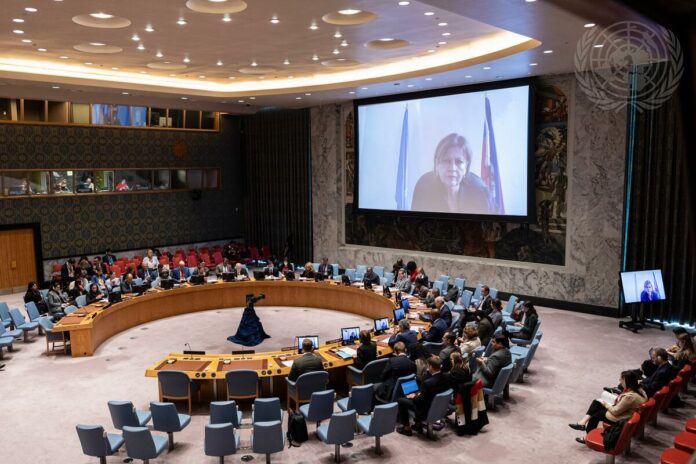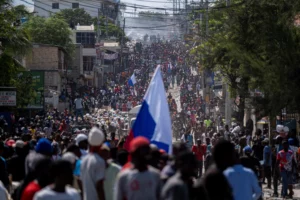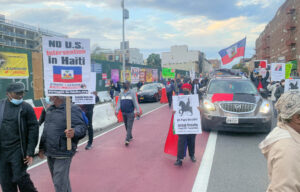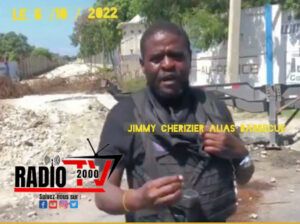
The gloves came off at the United Nations Security Council (UNSC) on Mon., Oct. 17, 2022 in one of the best bare-knuckle diplomatic throw-downs since the dawn of the new multipolar world on Feb. 24, 2022. And the subject was Haiti.
The United States is searching for a formula to justify its fourth major military intervention into Haiti in a century. To do so, Washington is playing fast-and-loose with the UN Charter, trying to deputize one nation or group of nations to intervene on its behalf. Sources say that the candidates for the honor are Canada, Mexico, and Norway.
However, veto-wielders China and Russia are pushing back, and there’s no guarantee that the U.S. (with its usual allies, Canada and France) will succeed in its gambit.
Brazil played the leadership role in the UN Mission to Stabilize Haiti (MINUSTAH), which lasted from 2004 to 2017. But that was a conventional UN “peace-keeping” mission authorized under the UN Charter’s Chapter 7, thoroughly directed by the UNSC.

What UN Secretary General António Guterres proposed in his Oct. 8 letter to the UNSC (S/2022/747) was an aberration, on two counts.
First, like its immediate predecessors, MINUSTAH and the UN Mission for Justice Support in Haiti or MINUJUSTH (which lasted from 2017 to 2019), any new mission would be a flagrant violation of Chapter 7, Article 43 which only authorizes the deployment of troops “to maintain or restore international peace and security.” Haiti’s current trouble is solely an internal political struggle, not a conflict between two states, although Dominican Republic’s President Luis Abinader ludicrously claims that Haitian migrants and refugees crossing into the neighboring country are a threat to its “national security.”
Furthermore, de facto Prime Minister Ariel Henry and his rump cabinet have absolutely no legitimacy or legal standing to invite foreign troops onto sovereign Haitian soil. He is merely a head of government, nominated but not sworn in by Haiti’s last elected head of state, President Jovenel Moïse, on Jul. 5, 2021, two days before his murder. Henry was shoe-horned into power two weeks later by the U.S.-dominated “Core Group” of ambassadors in Haiti. Moïse’s term indisputably ended on Feb. 7, 2022 (most legal experts say one year earlier), thus ending any legitimacy that Henry might have had.
Secondly, any Chapter 7 multinational military force deployed is supposed to be fully overseen and controlled by the Security Council. However, Guterres’ proposes that the UN pass the responsibility for military action to one country or group of countries, a formula which is nowhere in the UN Charter.
“The Security Council cannot ‘outsource’ a military mission,” explained Alfred-Maurice de Zayas, the first UN Independent Expert on the Promotion of a Democratic and Equitable International Order, appointed by the United Nations Human Rights Council. “The Secretary General can say whatever he wants but has no power. In this case, he is making an unwise proposal.”
In his letter, Guterres proposed a “rapid action force” made up of “one or several Member States, acting bilaterally [our emphasis] at the invitation of and in cooperation with the Government of Haiti, [that] could deploy, as a matter of urgency,… to support the Haitian National Police [PNH].”
He suggested two options for how to configure the force.

Option One would be a “multinational police task force” of advisors and trainers to “enhance the tactical and operational capabilities of the [PNH] to combat gang violence” while the PNH “would remain the only force on the front line of operational policing and anti-gang operations.”
Option Two would be a more aggressive “multinational special force” to support the PNH “in tackling gangs, including through joint strike, isolation, and containment operations across the country.” In short, a Special Forces hit squad.
Interestingly, the word “bilateral” is used six times throughout the eight-page letter of the multilateral body’s leader. This dovetails nicely with Washington’s Global Fragility Act (GFA), passed in 2019, which envisages the basing in Haiti of U.S. troops, using the State Department’s Agency for International Development (USAID) as a “humanitarian” cover, under a 10-year bilateral agreement.
To sell this ruse, Washington needs a bad-guy straw-man whom its white knights will slay. U.S. Ambassador to the UN Linda Thomas-Greenfield made the pitch:
“The draft resolution specifically lists Jimmy Cherizier, also known as “Barbecue,” as the subject of such sanctions. He is directly responsible for the fuel shortage that is crippling the country. By passing this resolution, we would take concrete actions to hold him and so many other violent criminals to account.” Cherizier is the foremost spokesman of the Revolutionary Forces of the G9 Family and Allies, Mess with One, You Mess with All (FRG9), an alliance of crime-fighting armed neighborhood organizations.
Thomas-Greenfield further tried to sell the formula by saying: “This is also a direct response to Prime Minister Henry’s and the Haitian council of ministers’ request for international assistance to help restore security and alleviate the humanitarian crisis.”
Predictably, Russia and China pushed back.
“We would like to underscore that external interference in the political process in Haiti,” said Dmitry Polyanskiy, First Deputy Permanent Representative of the Russian Federation to the UN. “Subsuming [Haiti’s] interest to the interests of well-known regional players [a thinly veiled reference to the U.S.] who view the American continent as their backyard is unacceptable.”
He also noted that “many opposition groups call for not allowing a foreign intervention, and they rightfully refer to a not-very-successful experience, to put it mildly, with external interference in the country’s affairs.”
Finally, “we cannot support the attempts to quickly push through a resolution for this council on the sanctions either,” Polyanskiy concluded.
China also opposed a military option saying it had “taken note of the immediate opposition from some political parties and groups to the presence of a foreign armed force in Haiti, at a time when the Haitian government lacks legitimacy and is unable to govern.”
Haitians held massive anti-invasion demonstrations in Port-au-Prince on Oct. 17, the 216th anniversary of founding father Jean-Jacques Dessalines’ murder. Many protestors waved Russian flags. In chaotic confrontations, Haitian police dispersed some of the demonstrators with tear-gas. The same day, about 60 demonstrators walked down Nostrand Avenue from Eastern Parkway to Flatbush Avenue in Brooklyn, NY to demand no intervention.
China did, however, express support for sanctions but gave no indication whatsoever that it agreed with Washington’s targeting of Cherizier, an anti-crime crusader. Cherizier’s call for a social revolution in Haiti is what alarms the U.S. and its allies in Haiti’s ruling class.
“China supports targeted sanctions including travel bans, assets freeze, and an arms embargo, among other measures, against gang members and their supporters,” Geng Shuang, the Deputy Permanent Representative of China to the UN said, likely referring to the criminals grouped in a confederacy known as G-Pèp. It includes murderous gangs engaged in kidnapping, extortion, rape, and assassination like the Five Second’s Gang of Village de Dieu, the Martissant gang of Ti Lapli, and the Croix-des-Bouquets gangs of Vitelhomme and 400 Mawozo, which has publicized on social media the decapitation of its victims of late.
Cherizier has also recently denounced the collaboration of the PNH with G-Pèp gunmen who ride in their armored cars.
Part of the Haitian bourgeoisie’s and Washington’s campaign against the G9 is to say not only that it is holding Haiti hostage by blocking Port-au-Prince’s Varreux Fuel Terminal, but also by spreading rumors on radios and social media that the G9 is selling the gas for their own profit.
“It’s their attempt to discredit us and fool the masses into thinking that the G9 steals and sells gas,” Cherizier told Haïti Liberté on Oct. 17. “It’s how they’re trying to make the people not trust us, just like when they accused us of receiving 10 million [$81,000], or 43 million [$348,300], or 20 million gourdes [$162,000] from Ariel Henry. It’s just pure defamation.”

“The terminal is closed,” Cherizier continued. “It is barricaded by huge trenches we dug and empty containers. If one wanted to take the gas, how would one get it out? The huge amount of gas they’re talking about, how many recipients would we need to have to get this gas and transport it? They say that we overcame the facility’s security guards; let’s hear the testimony of the terminal’s security agents. The terminal has 70% of the nation’s gas; such a terminal undoubtedly has cameras. Let them show the footage that proves their accusations against the G9. What is sure: the gas will not leave unless, and only unless, Ariel backs down from his decision to hike the gas price, and returns it to what it was before. As long as he sets it at the IMF’s price, the gas will not leave. Unless he uses imperialism’s military force to retake the terminal.
“It is not by chance that every day the U.S. talks about the G9, but the G9 has never kidnapped or raped anyone,” Cherizier went on. “We have not blocked Martissant, which for a year and four months has cut off the capital from four [southern] departments. The G9 did not block Croix-des-Bouquets. But the U.S. target, the beast to be slaughtered, is the G9 because we, like the popular masses, are demanding real change, so that the living conditions of people living in working-class neighborhoods improve so they live decently.
“The foreigners will land,” Cherizier said. “Let them come! However, they will not only face Jimmy Chérizier but all the angry people of the ghettoes, seething in their working-class neighborhoods, who have nothing to lose and are ready to fight and die for their country.
“We have threatened the interests of the oligarchs, the wheeler-dealers, who destroyed our industries,” Cherizier said. “They only buy to sell. They closed [the state sugar mill] HASCO, which had more than 30,000 workers, the cement plant, and the flour mill, and kept the population in misery. Certainly the interests of imperialism are threatened! Let it happen! When imperialism arrives, we will stand up to fight politically and defend our lives.”
Russia and China may thwart Washington’s designs in the UN, but the U.S. may then turn either to the Organization of American States (OAS) or even an impromptu hemispheric coalition, as it did to invade tiny Grenada in 1983.
“I think they will send soldiers from the CARICOM countries with support from U.S., Canada, Mexico, [and] DR,” tweeted Dr. Jemima Pierre, a Haitian analyst with the Black Alliance for Peace and Black Agenda Report.










[…] z Haiti Liberte. https://haitiliberte.com […]
[…] However, HRW is quite patently incoherent and defensive in the six-page presentation of its “Recommendations,” the only ones of the 98-page report worth reading. It brackets its call for foreign intervention with sentence upon sentence of legal gibberish about how the invaders need to be “focused on ensuring accountability,” denoting clear consciousness of the disastrous record of the two previous foreign military interventions over 20 of the past 29 years from 1994-2000 and 2004-2017. HRW piously vows to respect “the need to avoid more harm and abuses now, with adequate safeguards to avoid the serious abuses that resulted from past international interventions.” This is supremely unlikely given that the force Washington is proposing would not even have UN Security Council oversight and control, simply its imprimatur. […]
[…] HRW s’engage pieusement à respecter “la nécessité d’éviter plus de mal et d’abus maintenant, avec des garanties adéquates pour éviter les graves abus qui ont résulté des interventions internationales passées”. C’est extrêmement improbable étant donné que la force que Washington propose n’aurait même pas la surveillance et le contrôle du Conseil de sécurité de l’ONU, simplement son imprimatur. […]